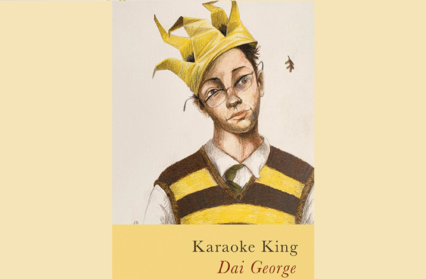Isobel Roach reviews Dai George‘s Karaoke King, a millennial-focused poetry collection which traverses the personal and the political.
In a claustrophobic forest brimming with anxiety and self-reflection, a young boy ‘whose dream last night was of a concert / and his frozen voice’ finds himself at a crossroads. So begins Dai George’s second collection, Karaoke King; a lyrical exploration of all things millennial, at turns tragic and triumphant but always intensely readable. Its opening poem, ‘Doxology’, acts as an overture of sorts, providing a grim and enticing glimpse into the poet’s troubled — yet ultimately hopeful — mind. It’s clear from the get go that this is an incredibly timely collection. George is effortlessly quotable, warning his readers of a ‘split and democratic sky […] “democratic” / as an argument neither side can win’.
George’s intentions in Karaoke King lie in the complicated intersection of what is political and personal. Like many others of his generation, George finds himself compelled to look within in an effort to improve and understand the world outside — both natural and material. The collection’s politics begins with a discerning autobiographical focus, particularly palpable in its climactic poetic sequence, ‘A History of Jamaican Music’. Sonically and rhythmically exciting, the poems in this sequence show George at his very best as he navigates his own white privilege as a lifelong fan of reggae. A love affair with Jamaican music comes face to face with the author’s whiteness in an exploration of conscience (‘History entrenches, like a garrison, round the speaker, / and never with its lines straight, or its ethics’). This poetic soul-searching extends to masculinity and the treatment of women (turn to ‘Real Rain’ for a scathing take-down of misogyny) and pays special attention to the climate crisis. Nature permeates the poems of Karaoke King, creeping into the indoor realm and acting as a fatal, prophetic symbol of the world to come; ‘My anger may never meet the air / but lies in wait, flesh under wax / in fruit that’s yet to perish, or to sell’.
A relationship with space and place is at the heart of George’s work. As a Cardiff-born poet, his writing sketches out an intimate portrait of the urban South Wales landscape from his youth. Just as important as the physical architecture of his birth city are the faces, voices, and personalities of family and friends that breathe life into memory. Particularly touching is ‘Shopping with Mam’ — a beautiful coming together of mundane and biblical acts of love in a Cardiff shopping centre.
Sharing a title with the collection, ‘Karaoke King’ is a stand-out poem — an explosion of musical and literary intertextuality relaid by a speaker that is both tragic and comic in his drunken state. George brings the high art of Wales’ poetic past to the mundane setting of a bar, interjecting his observations with a lyric from the nineteenth-century Welsh song ‘Myfanwy’. The song’s eponymous heroine appears as a background character who ‘staggers to her station […] beneath the gin’ as the Karaoke King ‘brings the house down to an empty bar’. This is a brief and passionate catharsis, an articulation of the speaker’s anxiety that goes unheard by his contemporaries, but is instead understood and accompanied by a ghostly ‘toxic male voice pageant […] belting out unchappelled hymns’. George’s finale to this poem incorporates lines from Dylan Thomas and the Tudor poet Thomas Wyatt, reworked into a twenty-first-century setting as he calls back to those who came before him.
‘Karaoke King’ is an exciting read — the cherry on top of an already powerful collection that speaks to all disenfranchised but resiliently hopeful millennials, as well as young people carving out an identity for themselves in a brave new world. The poems of Karaoke King serve as a reminder that there is goodness to be found in the aftermath of disappointment. As George writes in the final poem of the collection, one day ‘the door will open to a different garden’.
Karaoke King by Dai George is available now from Seren.
Isobel Roach is a regular contributor to Wales Arts Review.












